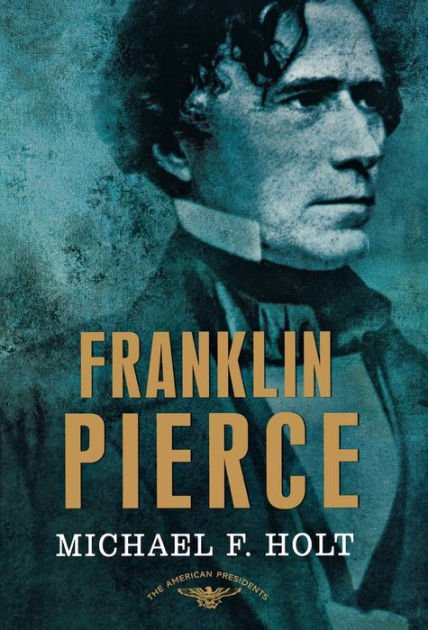Franklin Pierce
Franklin Pierce by Michael Holt
Tier 5
They don’t get much worse than Franklin Pierce. The argument for the worst president is probably a three-horse race between Pierce, his successor James Buchanan, and Andrew Johnson. It is no coincidence that these three presidents surround our greatest president, Lincoln, and the nation’s defining moment, The Civil War.
Now, as I keep harping on, a bad president does not necessarily make for a bad presidential biography. I firmly believe that someone should set out to write a trilogy of biographies on those three terrible presidents. (I am primarily a fiction writer and not a historian, so I don’t believe it is my place to take on that task, but someone should.) Something is fascinating about failure on such a grand scale.
Holt’s biography is short. That is probably its best quality. I got the feeling while listening to it that Holt himself wasn’t interested in writing this book. Having once found myself forty thousand words into a novel I didn’t want to write, I know the feeling. I chose to stop writing that and start on something I cared about. Perhaps Holt should’ve done the same. Of course, if he had, how would I have completed my presidential biographies challenge?
Pierce was from New Hampshire, of all places, and was, by all accounts, exceedingly charming. Holt makes a point of emphasizing this characteristic repeatedly in this book. Everyone seemed to love Pierce, and this is perhaps the only good thing one can say about the man.
In the 1852 election, he was a compromise candidate. He was from the North but wrote a letter during the convention detailing his support of the Fugitive Slave Act, which made the South comfortable with him. A good rule to follow: if, in the 1850s, the South was on your side, you’re on the wrong side. The Whigs were in complete disarray at this point following the disastrous presidency of Millard Fillmore (who probably deserved mention in the worst presidents of all time discussion), and after securing the Democratic nomination, Pierce walked to victory in the general.
Was there more to this election? Yes. Is it worth diving into? Not really.
I suppose the main thing that Pierce is known for is the Kansas-Nebraska Act. If you thought the Compromise of 1850 was bad, just wait until you get a load of the Kansas-Nebraska Act.
First, here is a little background I didn’t cover when discussing the Missouri Compromise. Part of that compromise involved drawing a line at 36°30' north latitude (forgive me if I wrote that incorrectly, I know nothing about geography). Anything north of that line was a free state, and anything south was a slave state, except Missouri, which was north of the line but could enslave people.
So, back to Pierce and the Kansas-Nebraska Act. This was all the brainchild of Stephen A. Douglas, an Illinois Senator known for his debates against Lincoln. He wanted to settle some land the US had left over from the Louisiana Purchase to build a transcontinental railroad. This land would fall north of the 36°30' line, making them free territories. Obviously, the Southern states couldn’t abide by this, and Pierce and Douglas decided it would be best to repeal the Missouri Compromise and allow the slavery issue to be resolved by popular sovereignty. Essentially the citizens of each territory would vote to determine if slavery should be allowed.
Somehow Pierce and Douglas had convinced themselves that this solution would put an end to the slavery debate in the United States. I have no idea how they convinced themselves of that, but that’s a politician for you.
What proceeded is known as Bleeding Kansas and was a series of increasingly violent encounters between pro-slavery and antislavery contingents. The number of dead ranges from around fifty to as high as two hundred. In these situations, you’re usually safe to assume the worst. All hell broke loose, and they got to have a little mini Civil War as an appetizer to the real one to come. They set up different capitals and legislators and wrote different constitutions.
This all likely sounds bad enough to you, but Pierce doubled down on his terrible decision and began supporting the pro-slavery factions. See, Pierce felt that abolition threatened the union and, as such, sided with the South every chance he could. This festering wound wouldn’t heal until after Pierce left office. His successor, the detestable James Buchanan, continued his policy of support for the pro-slavery faction, but it was clear the people wanted Kansas to be a free state.
Obviously, this whole fiasco is cited as a contributing factor to the Civil War. As I have repeatedly stated during this series, I feel the Civil War was inevitable. Slavery was too polarizing of an issue to be resolved peacefully. That said, men like Fillmore, Pierce, and Buchanan certainly didn’t help the situation.
He regularly criticized Lincoln in his post-presidency and was generally awful for most of his life. He was a heavy drinker and eventually died due to alcoholism, but not before he could express his support of Andrew Johnson’s racist Reconstruction policy. There’s another good litmus test for American politics – if you supported Johnson, you were on the wrong side.
Holt’s book covers these issues to the best of his ability. It’s not thrilling reading, and that is disappointing. The Civil War is, as I mentioned, the defining moment in our nation’s history, and we should have good biographies of the presidents who shared a role in causing it.
